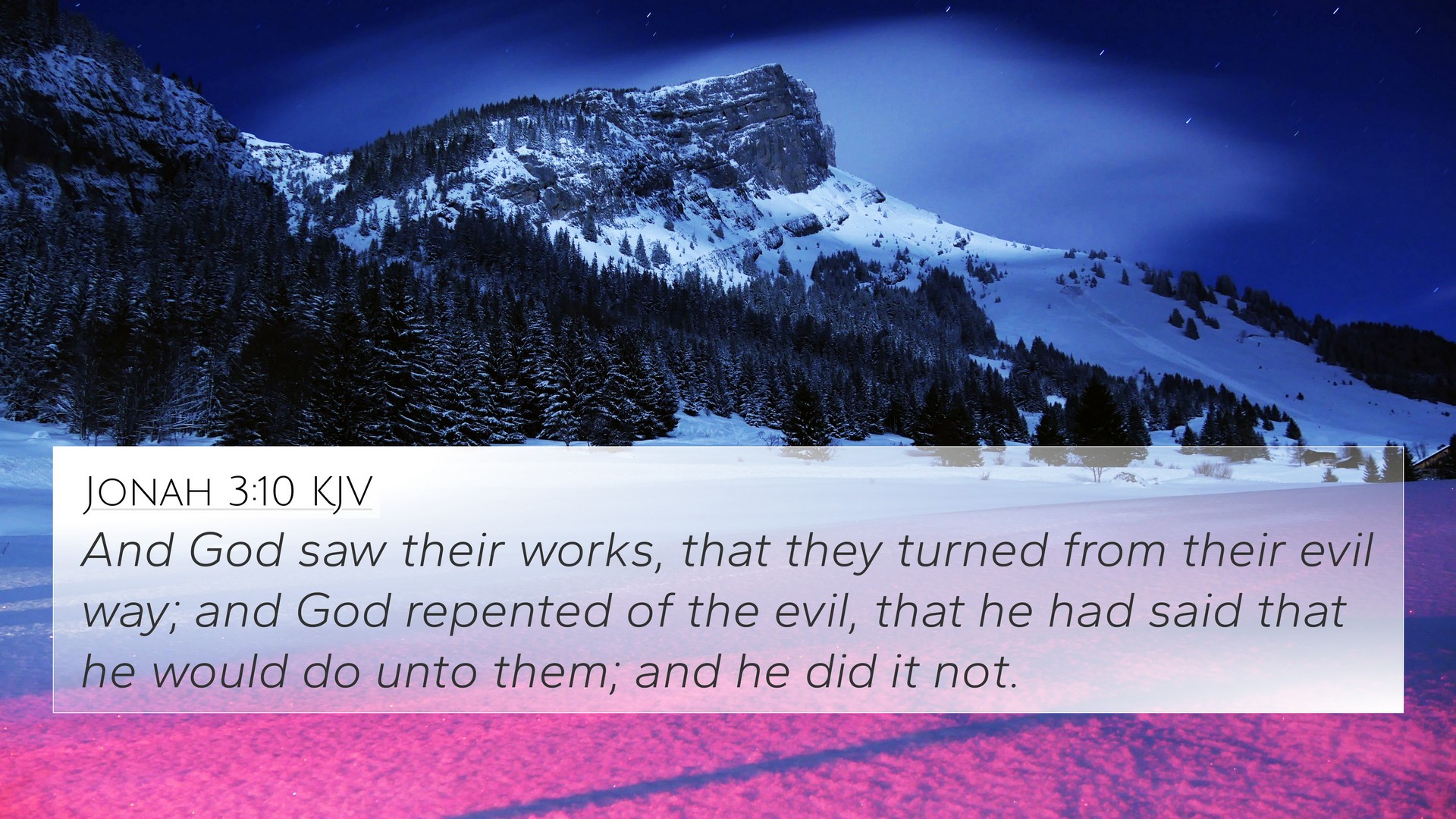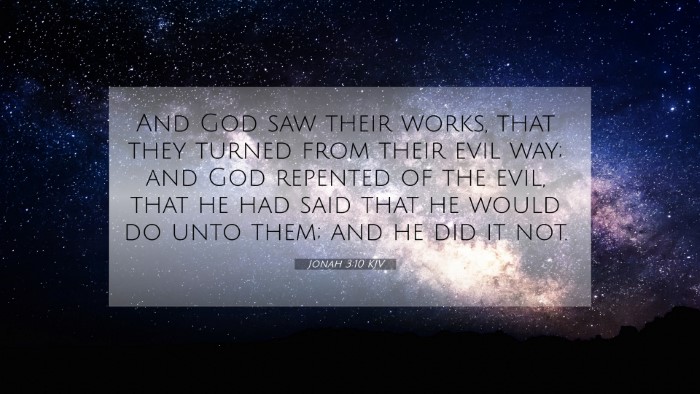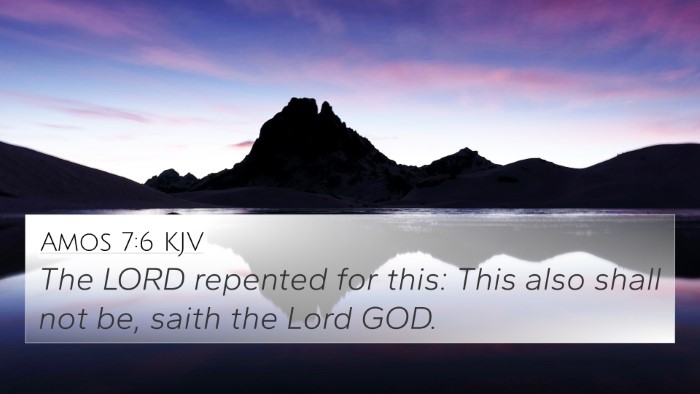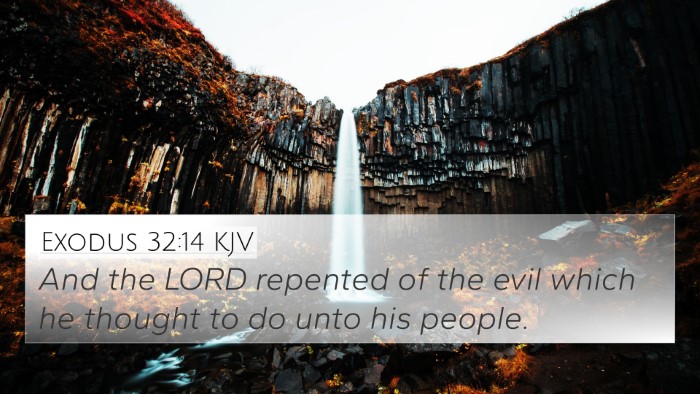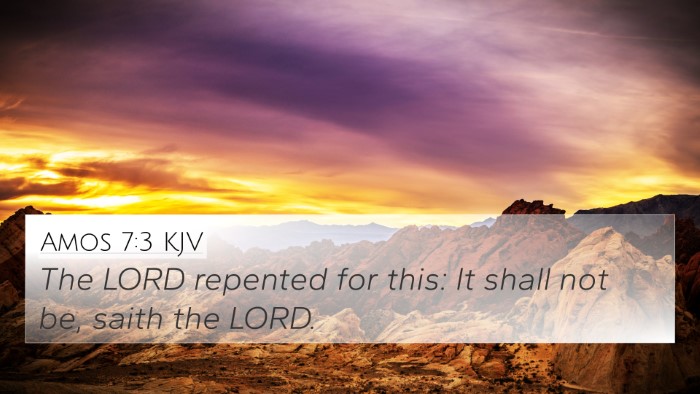Old Testament
Genesis Exodus Leviticus Numbers Deuteronomy Joshua Judges Ruth 1 Samuel 2 Samuel 1 Kings 2 Kings 1 Chronicles 2 Chronicles Ezra Nehemiah Esther Job Psalms Proverbs Ecclesiastes Song of Solomon Isaiah Jeremiah Lamentations Ezekiel Daniel Hosea Joel Amos Obadiah Jonah Micah Nahum Habakkuk Zephaniah Haggai Zechariah MalachiJonah 3:10 Similar Verses
Jonah 3:10 Cross References
And God saw their works, that they turned from their evil way; and God repented of the evil, that he had said that he would do unto them; and he did it not.
Uncover the Rich Themes and Topics of This Bible Verse
Listed below are the Bible themes associated with Jonah 3:10. We invite you to explore each theme to gain deeper insights into the Scriptures.
Jonah 3:10 Cross Reference Verses
This section features a detailed cross-reference designed to enrich your understanding of the Scriptures. Below, you will find carefully selected verses that echo the themes and teachings related to Jonah 3:10 KJV. Click on any image to explore detailed analyses of related Bible verses and uncover deeper theological insights.

Jeremiah 18:8 (KJV) »
If that nation, against whom I have pronounced, turn from their evil, I will repent of the evil that I thought to do unto them.

1 Kings 21:27 (KJV) »
And it came to pass, when Ahab heard those words, that he rent his clothes, and put sackcloth upon his flesh, and fasted, and lay in sackcloth, and went softly.
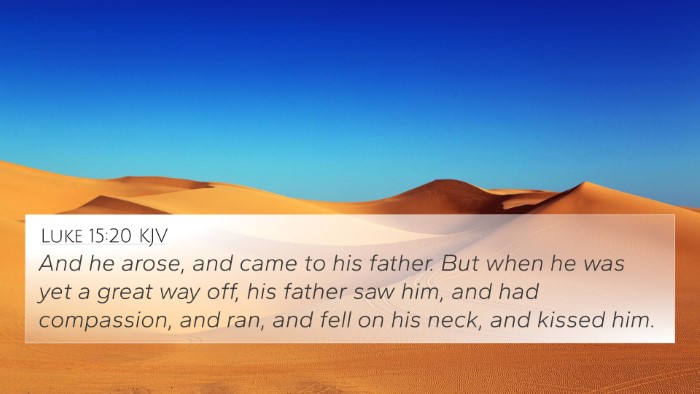
Luke 15:20 (KJV) »
And he arose, and came to his father. But when he was yet a great way off, his father saw him, and had compassion, and ran, and fell on his neck, and kissed him.
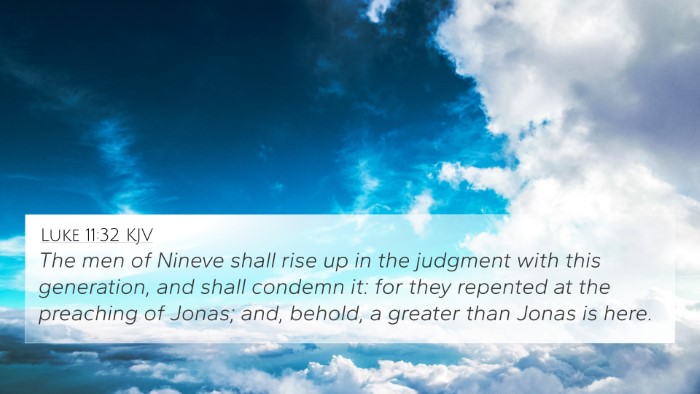
Luke 11:32 (KJV) »
The men of Nineve shall rise up in the judgment with this generation, and shall condemn it: for they repented at the preaching of Jonas; and, behold, a greater than Jonas is here.

Jeremiah 31:18 (KJV) »
I have surely heard Ephraim bemoaning himself thus; Thou hast chastised me, and I was chastised, as a bullock unaccustomed to the yoke: turn thou me, and I shall be turned; for thou art the LORD my God.
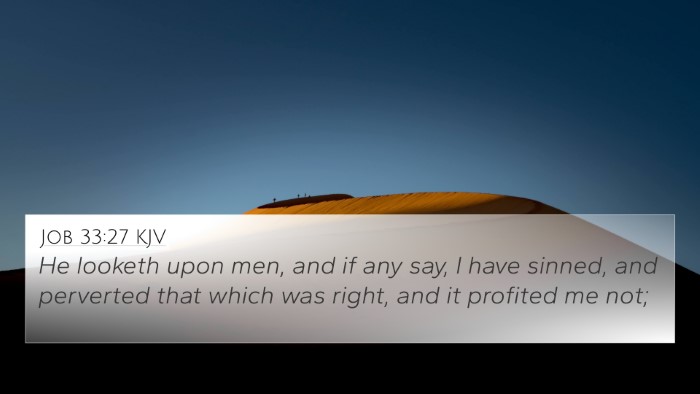
Job 33:27 (KJV) »
He looketh upon men, and if any say, I have sinned, and perverted that which was right, and it profited me not;

Joel 2:13 (KJV) »
And rend your heart, and not your garments, and turn unto the LORD your God: for he is gracious and merciful, slow to anger, and of great kindness, and repenteth him of the evil.
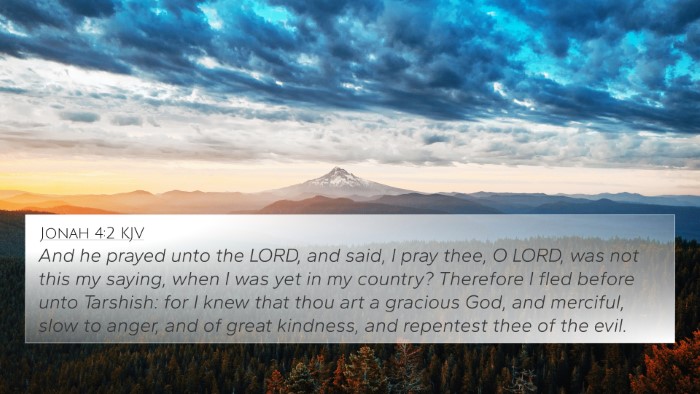
Jonah 4:2 (KJV) »
And he prayed unto the LORD, and said, I pray thee, O LORD, was not this my saying, when I was yet in my country? Therefore I fled before unto Tarshish: for I knew that thou art a gracious God, and merciful, slow to anger, and of great kindness, and repentest thee of the evil.
Jonah 3:10 Verse Analysis and Similar Verses
Understanding Jonah 3:10
The verse Jonah 3:10 reads: "And God saw their works, that they turned from their evil way; and God repented of the evil, that he had said that he would do unto them; and he did it not." This verse encapsulates a significant theme of repentance and divine mercy found throughout the Scriptures.
Summary of the Verse
In this passage, we see the remarkable response of God to the repentance of the Ninevites. Jonah preached to this great city, and contrary to the expectations of many, the people heeded his message and turned from their sinful ways. The narrative emphasizes God's willingness to forgive and change course in response to genuine repentance.
Commentary Insights
Matthew Henry's Commentary
Matthew Henry emphasizes the mercy of God in this passage. He notes that God's repentance is not a change of mind as humans understand it but a change in the action He was going to take based on the Ninevites' response. Henry describes the Ninevites' repentance as a true turning from their evil ways—a condition necessary for God's mercy.
Albert Barnes' Notes
Albert Barnes highlights the phrase "God repented" as a significant theological point. He argues that this indicates God’s responsiveness to human action. Barnes notes that this does not imply that God changes His nature but shows His willing engagement with humanity. He contrasts God's mercy with His justice, showing that though God initially intended to punish, He is gracious when there is sincere repentance.
Adam Clarke's Commentary
Adam Clarke discusses the concept of God's sovereignty and mercy, stressing that God's declaration of judgment was conditional. Clarke points out that the repentance of the Ninevites activated God's mercy, illustrating a profound truth about God’s nature—He desires repentance over destruction. Clarke also notes the importance of visible works accompanying true repentance.
Theological Themes
- Divine Mercy: The verse illustrates the limitless mercy of God, as He responds favorably to sincere repentance.
- Repentance: This passage emphasizes the transformative power of turning away from evil and returning to righteousness.
- Conditional Judgment: God's initial pronouncements can change in light of human actions, highlighting the dynamic nature of the relationship between God and humanity.
Bible Cross-References
- 2 Chronicles 7:14: A call for humility and turning from wicked ways for healing.
- Ezekiel 18:30-32: Emphasizes turning from all offenses to have life.
- Matthew 12:41: Jesus refers to the Ninevites' repentance as a testimony against the unrepentant.
- Acts 3:19: The call for repentance leading to forgiveness of sins.
- Luke 15:10: Joy in Heaven over one sinner who repents.
- James 2:13: Mercy triumphs over judgment, illustrating God's character.
- Romans 2:4: The goodness of God leads to repentance.
Connections Between Bible Verses
The message of Jonah 3:10 finds parallels and thematic connections throughout both the Old and New Testaments. The concept of repentance is central to numerous passages, bringing to light the relationship between God's love, justice, and mercy.
Inter-Biblical Dialogue
Understanding Jonah 3:10 in the context of other scriptures allows for rich theological insights. The connections foster an understanding of the broader narrative of redemption and the character of God. Cross-referencing biblical texts reveals that the themes of repentance and divine mercy are woven throughout the entire Bible.
Conclusion
Jonah 3:10 serves as a vivid reminder of God's mercy and willingness to forgive those who repent. It invites us to explore the depth of God's character through scriptural cross-referencing and comparative analysis of related verses. The themes of repentance and divine mercy resonate compellingly across both testaments, encouraging all believers to turn from sin and embrace God's forgiveness.
